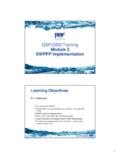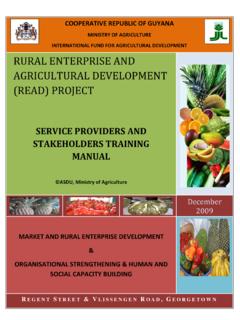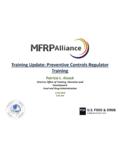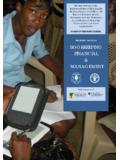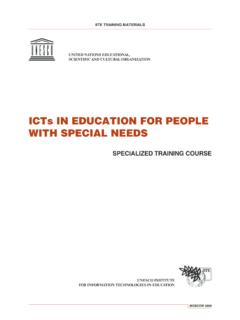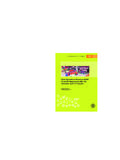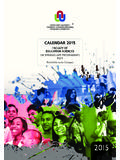Transcription of PRIMARY PREVENTION OF SUBSTANCE ABUSE A …
1 PRIMARY PREVENTION of SUBSTANCE ABUSE A Workbook for Project Operators Page 1 WHO/ MSD/ MDP/ Original: English Distribution: Limited PRIMARY PREVENTION OF SUBSTANCE ABUSE A WORKBOOK FOR PROJECT OPERATORS Department of Mental Health and SUBSTANCE Dependence Noncommunicable Diseases and Mental Health World Health Organization Geneva Demand Reduction Section Division for Operations and Analysis United Nations International Drug Control Programme Vienna PRIMARY PREVENTION of SUBSTANCE ABUSE A Workbook for Project Operators Page 2 Text only version including minor formatting modifications World Health Organization, 2000 This document is not issued to the general public, and all rights are reserved by the World Health Organization (WHO). The document may not be reviewed, abstracted, quoted, reproduced or translated, in part or in whole, without the prior written permission of WHO. No part of this document may be stored in a retrieval system or transmitted in any form or by any means - electronic, mechanical or other without the prior written permission of WHO.
2 The views expressed in documents by named authors are solely the responsibility of those authors. PRIMARY PREVENTION of SUBSTANCE ABUSE A Workbook for Project Operators Page 3 Background The United Nations International Drug Control Programme and the World Health Organization (UNDCP/ WHO) Global Initiative Project on PRIMARY PREVENTION of SUBSTANCE ABUSE endeavours to contribute to the PREVENTION and reduction of psychoactive SUBSTANCE ABUSE among young people, through community mobilisation, development and dissemination of good practices. As used in this workbook, the term psychoactive SUBSTANCE refers to any SUBSTANCE that when taken by a person, can modify perception, mood, cognition, behaviour or motor functions. These substances have devastating consequences for the person using them, their family and the community as a whole. Many countries recognise that the use of substances by young people is a serious health and social problem. Use of substances robs young people of their childhood and leaves them little chance to have a healthy lifestyle in the future.
3 PRIMARY PREVENTION is a universal priority for enhancing the health of young people and can be applied to PREVENTION of psychoactive SUBSTANCE ABUSE . Young people are particularly at risk for SUBSTANCE use, as they are in a period of life when patterns of behaviour are being formed and they are most likely to be influenced by peers and role models who may be involved in the use of substances. It is thus an important period in life when behaviours can be influenced for the benefit of long-term good health. Although the direct beneficiaries of this initiative are young people and those who play a significant role in their lives, PRIMARY PREVENTION efforts can also have a positive wider impact on communities where the projects are implemented. The role of the community in preventing SUBSTANCE ABUSE should be participatory and not merely that of responding to services planned and designed by external agencies or individuals. The community should actively participate in determining the problems and needs, developing solutions, and implementing and evaluating interventions.
4 PRIMARY PREVENTION should be comprehensive and should draw on existing human, financial and material resources to strengthen self-help and community participation. This is the underlying principle behind the UNDCP/ WHO Global Initiative on PRIMARY PREVENTION of SUBSTANCE ABUSE . This workbook and the facilitator guide have been developed for project operators involved in the Global Initiative Project on PRIMARY PREVENTION of PRIMARY PREVENTION of SUBSTANCE ABUSE A Workbook for Project Operators Page 4 SUBSTANCE ABUSE (Global Initiative). However, others involved in similar PREVENTION work can use these training materials. Acknowledgements We would like to express our gratitude to the Norwegian government for the financial support that made development of this workbook and the companion facilitator guide possible. In addition we would like to acknowledge the technical contribution of colleagues in UNDCP, WHO, South African Alliance on the PREVENTION of SUBSTANCE ABUSE (SAAPSA) and the regional offices of WHO and UNDCP in the three regions of implementation: Central and Eastern Europe, Southern Africa and South-east Asia.
5 In particular we would like to thank participants in the three regional workshops for their contribution during field-testing of this workbook and facilitator guide. We would also like to thank Ms. Tecla Butau, WHO African Regional Office for her diligent contribution to the revision of these training materials. Secretariat (HQ) Shekhar Saxena WHO, Geneva Mwansa Nkowane WHO, Geneva Christina Oguz UNDCP, Vienna Giovanna Campello UNDCP, Vienna Text Mwansa Nkowane Illustrations Harry McConville Layout and design Jhilmil Bahl and Tim Martindale Editing Sarah B. Assamagan PRIMARY PREVENTION of SUBSTANCE ABUSE A Workbook for Project Operators Page 5 Table of contents Operational definitions .. Module 1 Psychoactive substances .. Module 2 Psychoactive SUBSTANCE use among young people .. Module 3 Ways of responding to psychoactive SUBSTANCE use .. Module 4 A project development approach .. Module 5 Local situation assessment .. Module 6 Implementing the project.
6 Module 7 Monitoring and impact evaluation .. Further reading PRIMARY PREVENTION of SUBSTANCE ABUSE A Workbook for Project Operators Page 6 Introduction 1. Addressing psychoactive SUBSTANCE use among young people The reasons why young people use or experiment with psychoactive substances vary. One important set of reasons is closely tied to adolescent development itself. Adolescents are faced with the complex and emotionally charged task of developing a personal identity (a sense of who they are). Sometimes they may not have anyone with whom they can talk about their concerns. They are highly prone to peer pressure and often disregard parental guidance. Their larger social and environmental context is also an important factor. Studies have shown that involvement with psychoactive substances during this period is associated with other risk behaviours. Young people are not only vulnerable to the consequences of psychoactive SUBSTANCE use, but also to unprotected sex and other risk behaviours.
7 Ways must be found to address SUBSTANCE use among young people that also help them develop attitudes and social practices that promote health and social progress. 2. The workbook This. workbook is for project operators involved in the Global Initiative. A Project Operator is an individual designing or organising activities as part of the Global Initiative. They may be youths, parents, youth leaders, teachers, social workers or health workers. Most of the project work should take place in the community, bringing PREVENTION measures home to individuals, families and the community as a whole. Others involved in PREVENTION work can also use the workbook. PRIMARY PREVENTION of SUBSTANCE ABUSE A Workbook for Project Operators Page 7 3. Importance of the workbook for project operators Building capacity within the local community is an effective way of ensuring that limited resources are efficiently used. The ultimate aim of the workbook is to ensure that project operators are equipped with the necessary skills, knowledge, attitudes and training capabilities to be able to effectively impart relevant knowledge and skills to others.
8 In this way communities can become responsive, develop and grow stronger and take effective collective action to reduce the vulnerability of young people to psychoactive SUBSTANCE use and its consequences. By using this workbook the project operator can gain or build on the following: An understanding of objectives and principles in PRIMARY PREVENTION Basic knowledge about the needs of young people Basic skills in project development and implementation Awareness of networks and the importance of the role of volunteers A sense of when it is time to consult or refer young people for further support and care While many ideas, models and examples of PREVENTION exist; this workbook addresses only the basic issues in PRIMARY PREVENTION , project development and community mobilisation. The intent is not to train experts; but simply to provide a reasonable foundation for effective work, to stimulate innovative and creative thinking and to equip people to train others. This workbook should not be considered a textbook.
9 4. How to use the workbook Individual learners, who can read the text and go through the exercises that are provided or following a self-guided training course, can use this workbook. The workbook can also be used to structure a group training course. When the workbook is used in group training, exercises should be carried out in accordance with the trainer's preparation of the material. Active participation is encouraged, as it is known to enhance learning. PRIMARY PREVENTION of SUBSTANCE ABUSE A Workbook for Project Operators Page 8 5. How this workbook is organised The workbook is divided into 7 modules. Module 1 Psychoactive substances Provides basic information on common psychoactive substances. Module 2 Psychoactive SUBSTANCE use among young people Discusses reasons why young people use substances, and outlines risk factors and protective factors associated with SUBSTANCE use. Module 3 Ways of responding to psychoactive SUBSTANCE use Proposes a comprehensive way of addressing PRIMARY PREVENTION of SUBSTANCE ABUSE among young people.
10 Module 4 A project development approach Gives a step by step process for designing a project and explains the importance of each step. Module 5 Local situation assessment Emphasises the importance of initial assessment as a guide to effective project development and implementation. Common methods for collecting information are also outlined. Module 6 Implementing a project Offers specific ideas on how a project can be implemented and strengthened through human resource mobilisation. Module 7 Monitoring and impact evaluation Addresses the importance of conducting monitoring and impact evaluation, and gives some guidelines on how to conduct them. PRIMARY PREVENTION of SUBSTANCE ABUSE A Workbook for Project Operators Page 9 6. The structure of the workbook modules Each workbook module begins with a list of learning outcomes. The learning outcomes should be the basis for evaluating knowledge and skills learnt at the end of each module. Exercises are provided and are designed to give the workbook user(s) the opportunity to enhance learning and to actively interact with others, if the setting is group training, or to stimulate creative thinking, when working alone.










